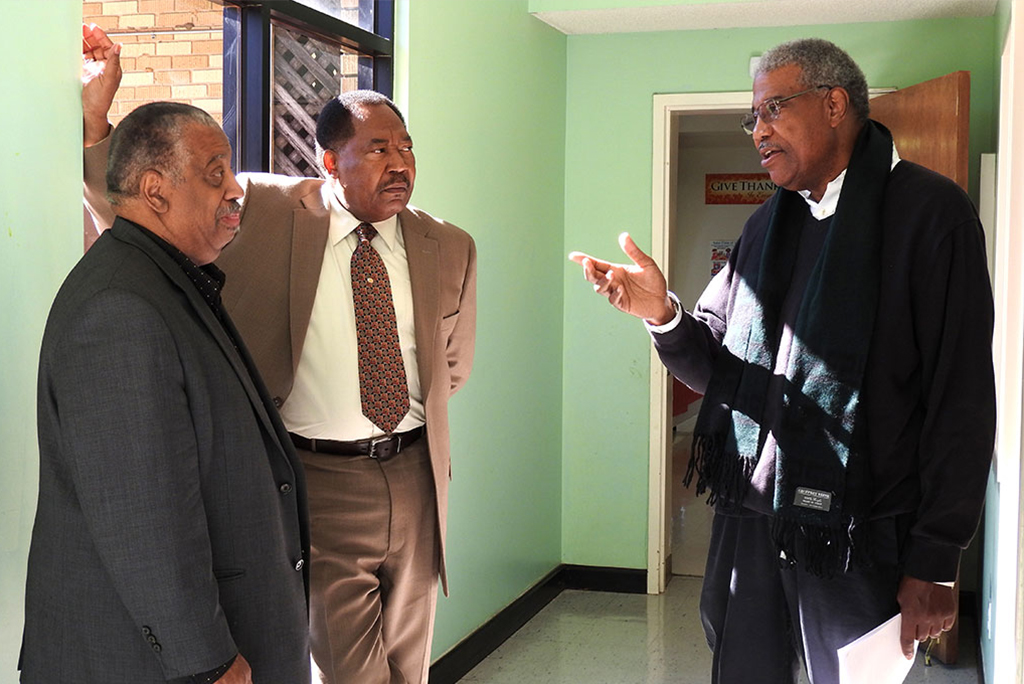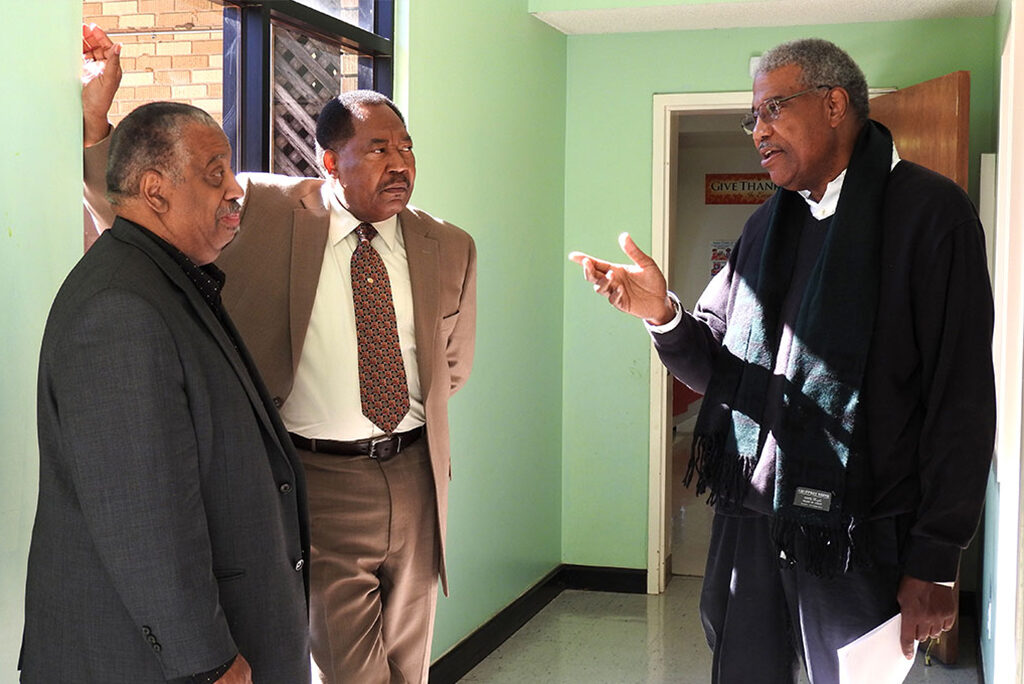
By Paula Schlueter Ross (paula.ross@lcms.org)
MOBILE, Ala. — In a two-hour discussion on the future of struggling Concordia College Alabama (CCA), in Selma, Ala. — the country’s only historically black Lutheran college — participants at the Feb. 1-4 meeting here of the LCMS Black Clergy Caucus voiced their concerns:
- CCA was started as a “mission” of the Synod, said a relative of missionary-educator Dr. Rosa Young. “We can’t snatch the program away from poor people. It’s not Christ-like.”
- How are we going to change the school to “stop the bleeding” of money every year?
- “We need to make a firm statement that we are not in favor of Selma being closed.”
That “firm statement” came the next morning — the result of a quickly appointed six-member task force — in the form of a letter from the caucus to five parties: LCMS President Rev. Dr. Matthew C. Harrison, the LCMS Board of Directors, the LCMS Council of Presidents, CUS President Rev. Dr. Dean O. Wenthe and the CCA Board of Regents.
The letter — emailed Feb. 11 — begins with a Scripture quote: “Then those who feared the Lord talked with each other, and the Lord listened,” from Malachi 3:16, and includes that Black Clergy Caucus members are “strongly opposed to the closing of Concordia College Alabama” and “call upon Synod to address the concerns of [CCA] in a manner that is consistent with its support of other Concordia University System institutions.”
The letter asks “the Synod in convention to consider these issues” and that a task force be created to make recommendations regarding the operation of the school “under CUS.” It encourages all LCMS congregations to pray for CCA, and asks the Synod to “consider [CCA] a gift of God for Gospel outreach.”
CCA’s survival plan
The topic of saving Concordia College Alabama from possible closure became a priority for caucus participants — many of whom graduated from CCA — after a Feb. 2 presentation by the Rev. Kurtis Schultz, president of the LCMS Southern District and a member of the college’s Board of Regents.
Schultz distributed copies of an 11-page document — prepared and shared with the LCMS Board of Directors by the Selma Board of Regents “for the survival, transformation and flourishing of the college” — that offers two potential options for keeping CCA operational: one would separate it from the CUS; the other would retain its CUS membership. Both options require significant financial assistance. The document requested the LCMS Board of Directors to consider the options during its upcoming meeting. (Read a related story, “Board adopts resolution ‘to support Concordia College Alabama.’ “)
Grads’ perspectives
In an interview with Reporter later in the caucus meeting, Concordia, Selma, graduates Rev. Frank Marshall and the Rev. Dr. McNair “Tony” Ramsey — both of whom continued their education at Concordia University, Seward, Neb., and Concordia Theological Seminary — explained why they believe closing the school would be a big mistake for the Synod.
Marshall said it’s important to remember that CCA was “started as a mission, and it’s still a mission” — a “powerful” mission that has touched every one of the Synod’s black congregations, almost all of its black pastors and educators, and even public-school teachers and pastors of other denominations who got their start at the school.
And, he adds, its closing could seriously damage the future of LCMS black ministry — a repeat of what happened after Immanuel College in Greensboro, N.C., closed in 1961. “You have [black] pastors our age [early 70s] and then you have pastors in their late 80s and 90s — there are no [black] pastors [in between].”
Ramsey, who worked at CCA for nearly 32 years, including a three-year stint as its interim president, said the college’s location amid some of the poorest counties in Alabama is what makes the school so valuable. He calls CCA — with the lowest tuition of all 10 CUS schools — “the only hope” of area families, many of whom have annual incomes of $15,000 or less.
Caucus officers
In other action, the caucus voted to extend the terms of its current officers two more years. Those officers, elected in 2014, are President Rev. Byron R. Williams Sr. of Dallas, Vice-President Rev. Aubrey J. Watson Jr. of New Orleans, Treasurer Rev. Jerome N. Terry of New Orleans, Secretary Rev. Warren Lattimore of New Orleans, Assistant Secretary Rev. Elstner Lewis of Chicago and Chaplain Rev. James McDaniels of Greensboro, N.C.
Black Ministry report
In his report to the caucus, the Rev. Dr. Roosevelt Gray Jr., director of Black Ministry with the Synod’s Office of National Mission, noted that the LCMS includes more than 300 black-ministry congregations (“If you have one black member, you’re in black ministry,” he said).
Gray noted that blacks represent only 3 percent (or 70,000) of the Missouri Synod’s 2.1 million baptized membership, even though they make up 14 percent of the U.S. population.
“We need to be 21st-century Lutheran missionaries,” he said, especially since one in three American adults has “no religious affiliation” and the United States is considered the world’s “third-largest unreached country.”
Lutherans, he said, “need to be in those places where people are hurting,” such as Ferguson, Mo., where the LCMS is one of four area partners in the Community Empowerment Center of Ferguson, expected to open this summer. (Read a related story, “LCMS, partners break ground for Ferguson ‘Empowerment Center.’ “)
Gray listed a number of priorities for LCMS Black Ministry, including planting churches, providing leadership training, revitalizing congregations, and supporting and strengthening school ministries.
Next year’s biennial Black Ministry Family Convocation, he said, coincides with the 140th anniversary of LCMS Black Ministry, and planners are hoping for 1,000 participants. The convocation likely will be held in July 2017 in either Mobile or Birmingham, Ala.
He described what he calls “windshield evangelism” — driving through a congregation’s neighborhood and asking passersby, “Where is the Lutheran church?” If people don’t know, the congregation might need to become more externally focused, and perhaps develop collaborative partnerships with others in the community, he said.
Gray shared a long list of LCMS resources, including two scholarship funds: the Richard C. Dickinson Memorial Fund for church-work students, and the Help the Children Come Scholarship Fund for children who cannot afford to attend LCMS schools. Other resources are available for outreach, leadership training, youth ministry, urban ministry, church planting, and community development and housing.
He said Black Ministry would pay for a representative from Rebecca’s Garden of Hope Tutoring and Mentoring Program to visit black-ministry congregations interested in starting after-school programs for children. LCMS grant-writing workshops also are available to congregations searching for funding for their outreach programs. And plans for starting Rosa Young Academies for elementary-grade students and Young Scholars Academies for daycare/preschool children are being developed now for Synod congregations.
Benefiting from available resources “starts with us, as pastors in our congregations,” Gray said. “You don’t have to struggle alone. We can help.”
Transforming a neighborhood
In their presentation to the caucus, Leevones Fisher and Salome “Sweet” Wiley described how their nonprofit organization, the Bay Area Women’s Coalition, transformed their formerly crime-ridden Mobile neighborhood into a safe one by:
- working with volunteer “block captains,” churches, the FBI and local police departments to rid the area of drug houses and prostitution.
- providing medical and other assistance to residents with HIV/AIDS.
- repairing homes for free, and building low-cost new homes and senior apartments.
- distributing educational scholarships.
- opening a public library at Trinity Lutheran Church — the only one in Alabama that’s located on church property.
- establishing a free clinic.
Since the coalition was formed in 1997, its efforts, combined with governmental agencies, have brought close to $25 million in grants to the neighborhood. The organization also makes use of hundreds of volunteers — young and old — in its mission to “change our community house by house, street by street, block by block.”
“We must become the change we want to see,” advised Fisher, who went door to door to recruit coalition members and opened her own home to them “every night” in the early days for discussion and planning.
“Everybody can be great,” she says, “because anybody can serve,” and if you’ve got even a little bit of power, “use the power that you’ve got” to make positive changes in the world.
Meeting community needs
In her “Introduction to Community Development,” LCMS National Housing Support Corporation (NHSC) Chief Executive Nicole Ridley said she’s ready to offer support, consultations and resources to anyone who’s interested in bettering their community through housing, community finance, business development and community building/organizing. Also available to LCMS entities (and their community partners) interested in developing affordable housing or providing other community development services in Illinois, Indiana and Missouri are low-interest loans from NHSC. Since its start in 2007, NHSC has provided $8.2 million in services and support for community-development initiatives Synodwide.
“People living in some urban and rural communities around LCMS altars are hurting and they need help — and they are looking to the church,” Ridley said. Community development is one way congregations “can reach out and serve,” she added, and NHSC can help them identify their communities’ needs, plan how to meet those needs and put those plans into action.
Often, those needs already are being addressed by others, and Lutherans might consider developing partnerships with colleges/universities, community-action programs, community-based organizations, churches, workforce development agencies, micro-enterprise programs and community-development finance institutions.
Ridley also shared examples of funding sources that are available for community-development projects, including block grants, tax credits, local/state/federal governments, banks, foundations, the Small Business Administration and Lutheran Church Extension Fund.
Instead of perceiving a need, she said, “get out of the sanctuary” and survey area residents, businesses and agencies to find out: “What is the greatest unmet need?”
For more information or assistance, contact Ridley at nicole.ridley@lcms.org or 314-996-1376.
Rosa Young statue
Ramsey, president of the CCA Alumni Association, brought to the caucus a half-dozen foot-tall statues of Rosa Young, available for $100 each, or $120 with shipping. Money raised through the sale of the statues will go toward erecting a life-size statue of Young on the CCA campus — a project estimated to cost about $60,000 — by year’s end.
For more information or to purchase a statue, contact Ramsey via email at mcnairramsey@gmail.com.
‘We serve an awesome God’
Caucus President Williams described the meeting as “very productive” and added that “it was especially nice” to see several African ministries pastors there.
A highlight for him, he said, was the presentation by Fisher and Wiley on how their Bay Area Women’s Coalition “worked hard with local and city leaders to turn this high-crime, drug-infested area into an area where folks are proud to call home.”
Regarding Concordia College Alabama, Williams said he’s known “quite a few of the graduates and have seen how they have helped to impact their communities and the kingdom in a mighty way!” He urged the caucus and other LCMS parties to “look for common ground” in seeking solutions and “to call upon this awesome God of ours.”
Said Williams: “We serve an awesome God who can turn any situation around, no matter how bleak it looks.”
Posted March 3, 2016
